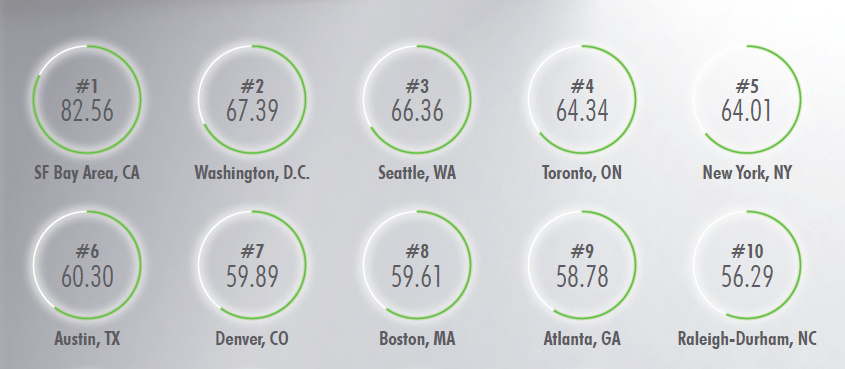Denver moved up one spot to No. 7 on CBRE’s Tech Talent Scorecard, part of its annual Scoring Tech Talent Report, which ranks 50 North American markets according to their ability to attract and grow tech talent.
Tech labor concentration – or the percentage of total employment – is an influential factor in how “tech-centric” the market is and its growth potential. Denver’s tech-talent labor pool is the 12th largest nationally at 113,270 workers, which amounts to 6.7 percent of the overall Denver workforce. The national average is 3.7 percent.
The top six markets for tech talent in 2020 preceding Denver were the San Francisco Bay Area, Washington DC, Seattle, Toronto, New York and Austin, Tex. Denver displaced Boston as the No. 7 ranked market due to its faster tech talent growth rate.
“Denver’s continued trajectory in the Tech Talent rankings is no surprise as the high cost of living, long commute times and hyper-competitive job markets on both coasts have been the ultimate marketing campaign for our city. As most companies plan to implement some version of a remote work strategy coming out of COVID-19, Denver will benefit. We will continue to see in migration of tech talent that can now choose where they live, despite where they work. And as entrepreneurs and founders enjoy more autonomy in where they launch, our hope is that even more of the next generation of tech elects to call Denver home,” said Alex Hammerstein, senior vice president with CBRE’s Tech & Media practice in Denver.
The report outlines how tech-talent jobs are positioned to weather COVID-19 and related shutdowns and the ensuing recession because, more than ever, companies across all industries need the technical skills that this talent base offers. Many tech products and services such as streaming, remote communications and social media now are in higher demand to support remote work and social distancing. Tech employment has shown it can withstand economic shocks: In the 2008-2010 recession, tech-talent employment declined by 0.5 percent while overall U.S. employment registered a 5.5 percent drop.
“We expect that most tech-talent markets and professions will thrive after the pandemic subsides, and many that facilitate remote work and tech services such as e-commerce, social media and streaming services may have even greater growth opportunities accelerated by the COVID-19 disruption,” said Colin Yasukochi, executive director of CBRE’s Tech Insights Center. “Markets that have strong innovation infrastructure – leading universities and high concentrations of tech jobs – will lead the next growth cycle.”
CBRE’s Tech Talent Scorecard is determined based on 13 unique metrics, including tech talent supply, growth, concentration, cost, completed tech degrees, industry outlook for job growth, and market outlook for both office and apartment rent cost growth.
Denver Highlights:
- Denver’s tech-talent labor pool is the 12th largest nationally at 113,270 workers, which amounts to 6.7% of the overall Denver workforce. The national average is 3.7%.
- Denver is the fourth most-concentrated millennial market, with 30.1% of its population aged 22 to 36. Denver’s millennial population increased by 19.6% (51,386 people) since 2013.
- Denver has the fifth fastest-growing tech labor pool in North America. Over the past five years, Denver added 28,230 tech jobs.
- From 2014 to 2018, Denver saw a 32.6% increase in tech degree completions (4,759 degrees completed in 2018).
- Despite rising tech degree completions, Denver is a net tech job creator, also known as a “brain gain” market—adding 7,923 more tech talent jobs than graduates over the last five years.
- In terms of cost, Denver is the sixth most-expensive market for operating a 500-person tech company, with an estimated annual cost of $48.4 million. The most expensive in the top 50 tech-talent markets: the San Francisco Bay Area at $62 million; the least: Montreal at $29.6 million.









